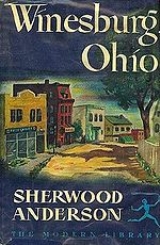Maybe it’s not a bad story. Maybe it’s a big thing.
The title of this blog comes from an old mentor of mine, John Keeble. He referred to our books in progress not as novels or short story collections or books-and certainly not as MFA theses-but simply as “big things.”
It was my second year of graduate school, and I knew I was trying to write something akin to Winesburg, Indiana. Instead of emerging one by one, however, the stories came out hopelessly fused.
Imagine if Sherwood Anderson sat down and wrote the title, “New Willard House” and proceeded to describe all the characters who lived in or passed through that fictional boarding house. The end.
That’s a pretty good description of the story I submitted to Keeble’s workshop for discussion, a big, messy failure of a story. I knew it, and everyone sitting around that table knew it.
And then the most amazing thing happened. Keeble opened the discussion by saying, “Some of you are working on stories, on the small thing, but I think this piece wants to be a big thing. Rather than talk about whether or not this works as a story, let’s talk about it as material toward a larger project.”
Just like that, Keeble shifted the default setting of the workshop from dissection to enlargement, from what’s wrong to what could be. My peers weren’t allowed to say, “This story is muddled and digressive. There’s no main character and no dramatic arc.” All of which would have been absolutely true.
Instead, they said things like this: “Oh, that Tandy Hard. Good character. And Elizabeth Willard. She almost kills her husband. That’s a story. Oh, and also the night she dies with all that money hidden in the floor. That’s a good story. And maybe the day George Willard leaves the boardinghouse once and for all is a story in itself, not just a scene at the end of this story.”
Forty-five minutes of productive discussion, and I walked out with pages of scribbled notes, stories crystallizing in my brain, and boom, I was off.
I was lucky.
Typically, students want to prescribe. They want to talk about what’s not working. It’s up to the instructor to create the default setting, to frame the workshop so that big things can be brought to the table and discussed meaningfully.
Next time, I’ll talk about some of the ways I try to do that.
Teaching

Thanks Cathy for your post. I too often find myself coming up against a certain number of pages of work- around the one fifty mark, a mess of characters and ideas that are held together primarily by place and circumstnace, but that don't seem to be heading in the direction of novel. It is a great process getting all the ideas out, but then turning the corner towards shaping them into something bigger, more cohesive and with interest and intrigue is such a daunting task as to seem impossible, perhaps not worth the effort. My first novel got stuck at that place and if it hadn't been for my thesis advisor and a graduation deadline hanging over my head, I don't know that I would have had the perseverence to wrestle through the mess. It's like untangling and sorting a mass of fine jewelry chains so that you can lay them side by side and see each one's unique strand. Having others to talk to, to read your work and perhaps suggest possibilities is one of the best ways to create the inspiration necessary to turn that corner.
Tracy, that's why I think it's absolutely imperative to have a writing group or a few trusted and dedicated readers. They school us when we are no longer writing "for school."